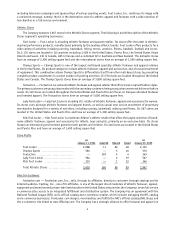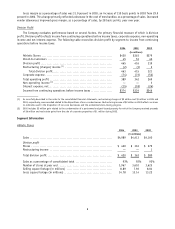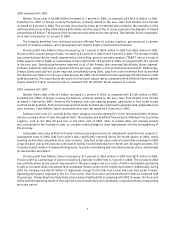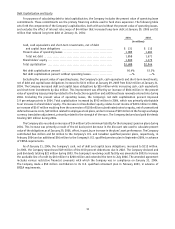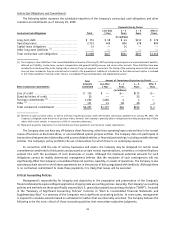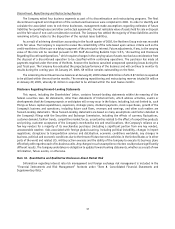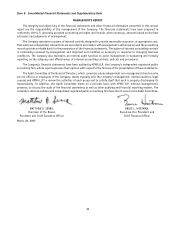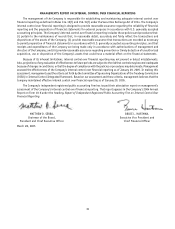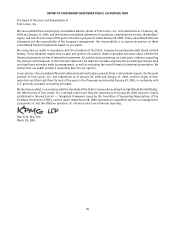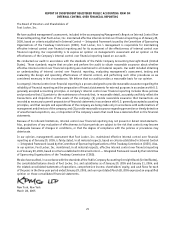Foot Locker 2004 Annual Report Download - page 30
Download and view the complete annual report
Please find page 30 of the 2004 Foot Locker annual report below. You can navigate through the pages in the report by either clicking on the pages listed below, or by using the keyword search tool below to find specific information within the annual report.
Contractual Obligations and Commitments
The following tables represent the scheduled maturities of the Company’s contractual cash obligations and other
commercial commitments as of January 29, 2005:
Payments Due by Period
Contractual Cash Obligations Total
Less than
1 Year
2–3
Years
4–5
Years
After 5
Years
(in millions)
Long-term debt .................................. $ 351 $ 18 $ 44 $113 $ 176
Operating leases ................................. 2,723 449 806 578 890
Capital lease obligations ......................... 14 — 14 — —
Other long-term liabilities
(1)
..................... — — — — —
Total contractual cash obligations ............... $3,088 $467 $864 $691 $1,066
(1) The Company’s other liabilities in the Consolidated Balance Sheet as of January 29, 2005 primarily comprise pension and postretirement benefits,
deferred rent liability, income taxes, workers’ compensation and general liability reserves and various other accruals. These liabilities have been
excluded from the above table as the timing and/or amount of any cash payment is uncertain. The timing of the remaining amounts that are known
have not been included as they are minimal and not useful to the presentation. Additional information on the balance sheet caption is included
in the “Other Liabilities” footnote under “Item 8. Consolidated Financial Statements and Supplementary Data.”
Amount of Commitment Expiration by Period
Other Commercial Commitments
Total
Amounts
Committed
Less than
1 Year
2–3
Years
4–5
Years
After 5
Years
(in millions)
Line of credit .................................... $ 175 $ — $— $175 $—
Stand-by letters of credit ........................ 25 — — 25 —
Purchase commitments
(2)
........................ 1,696 1,686 6 4 —
Other
(3)
.......................................... 131 41 58 28 4
Total commercial commitments .................. $2,027 $1,727 $64 $232 $ 4
(2) Represents open purchase orders, as well as minimum required purchases under merchandise contractual agreements at January 29, 2005. The
Company is obligated under the terms of purchase orders; however, the Company is generally able to renegotiate the timing and quantity of these
orders with certain vendors in response to shifts in consumer preferences.
(3) Represents payments required by non-merchandise purchase agreements and minimum royalty requirements.
The Company does not have any off-balance sheet financing, other than operating leases entered into in the normal
course of business as disclosed above, or unconsolidated special purpose entities. The Company does not participate in
transactions that generate relationships with unconsolidated entities or financial partnerships, including variable interest
entities. The Company’s policy prohibits the use of derivatives for which there is no underlying exposure.
In connection with the sale of various businesses and assets, the Company may be obligated for certain lease
commitments transferred to third parties and pursuant to certain normal representations, warranties, or indemnifications
entered into with the purchasers of such businesses or assets. Although the maximum potential amounts for such
obligations cannot be readily determined, management believes that the resolution of such contingencies will not
significantly affect the Company’s consolidated financial position, liquidity, or results of operations. The Company is also
operating certain stores for which lease agreements are in the process of being negotiated with landlords. Although there
is no contractual commitment to make these payments, it is likely that leases will be executed.
Critical Accounting Policies
Management’s responsibility for integrity and objectivity in the preparation and presentation of the Company’s
financial statements requires diligent application of appropriate accounting policies. Generally, the Company’s accounting
policies and methods are those specifically required by U.S. generally accepted accounting principles (“GAAP”). Included
in the “Summary of Significant Accounting Policies” footnote in “Item 8. Consolidated Financial Statements and
Supplementary Data” is a summary of the Company’s most significant accounting policies. In some cases, management
is required to calculate amounts based on estimates for matters that are inherently uncertain. The Company believes the
following to be the most critical of those accounting policies that necessitate subjective judgments.
14


